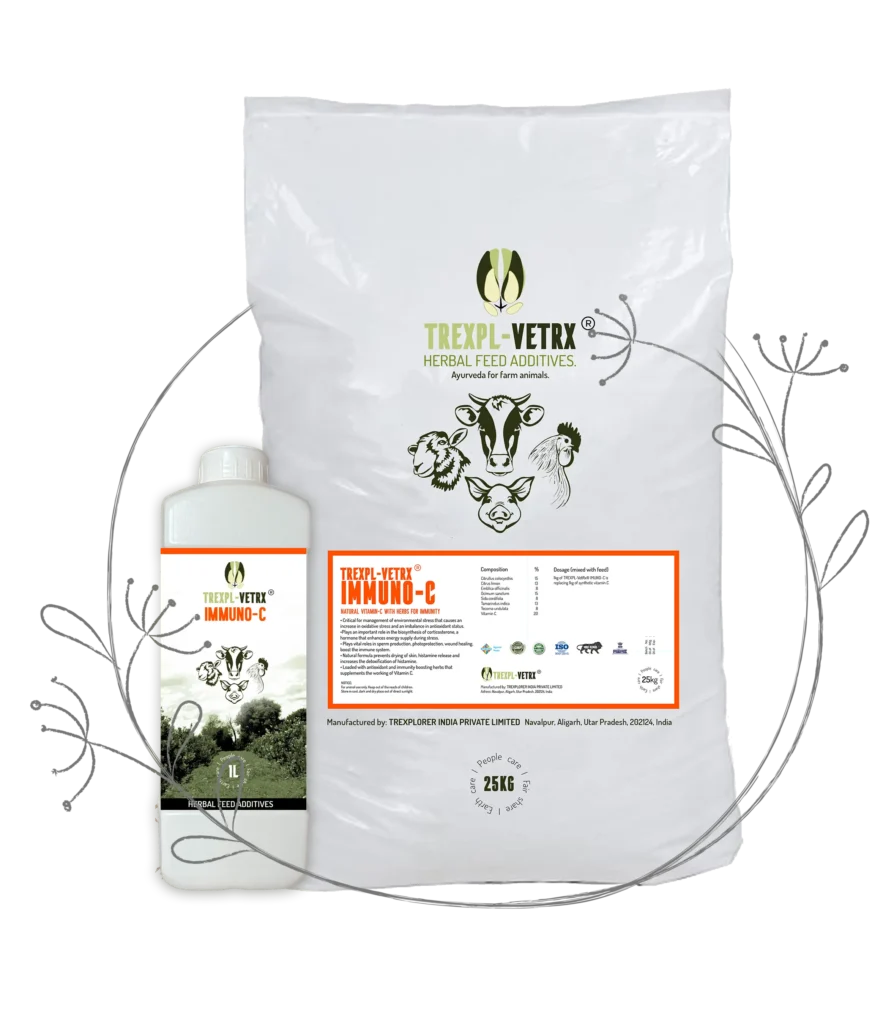TREXPL-VetRx® IMMUNO-C CONTAINS VITAMIN-C AND INDIAN HERBS CRITICAL FOR THE MANAGEMENT OF ENVIRONMENTAL STRESS THAT CAUSES AN INCREASE IN OXIDATIVE STRESS AND IMBALANCE IN ANTIOXIDANT STATUS
WHY CHOOSE IMMUNO-C?
Vitamin C, also known as ascorbic acid, is an essential nutrient for animals, including poultry and livestock. When used as an additive in animal feed, vitamin C provides several benefits and functions in the body. Here’s how vitamin C works as a feed additive:
Immune Function
Vitamin C plays a vital role in supporting immune function. It helps stimulate the production and activity of immune cells, such as lymphocytes and phagocytes, which are important for fighting off infections and maintaining overall health. In animal feed, vitamin C supplementation can enhance immune responses and improve disease resistance, particularly during periods of stress or disease challenges.
Antioxidant Activity
Vitamin C is a potent antioxidant that helps protect cells from oxidative damage caused by free radicals. By neutralizing free radicals, vitamin C prevents oxidative stress and supports overall cellular health. In animal feed, vitamin C acts as an antioxidant, helping to maintain the stability and integrity of feed ingredients and preventing nutrient degradation.
Collagen Synthesis
: Vitamin C is essential for the synthesis of collagen, a protein that provides structure and strength to tissues, including skin, bones, cartilage, and blood vessels. Adequate vitamin C intake is necessary for proper wound healing, tissue repair, and maintaining the integrity of connective tissues. In animal feed, vitamin C helps support tissue health and resilience.
Iron Absorption
Vitamin C enhances the absorption of dietary non-heme iron, the form of iron found in plant-based feed ingredients. Non-heme iron is less efficiently absorbed compared to heme iron, which is derived from animal sources. Vitamin C acts as a reducing agent, converting non-heme iron to a more absorbable form, thereby improving iron uptake and preventing iron deficiency anemia in animals.
Stress Reduction
Plays a role in mitigating the negative effects of stress on animals. During periods of stress, such as transportation, temperature fluctuations, or disease challenges, animals may experience increased oxidative stress and compromised immune function. Vitamin C supplementation in feed can help counteract these effects, reducing stress-related negative impacts on animal health and performance.
TANNIN
Tannins are naturally occurring compounds found in various plant species, including tree barks, fruits, leaves, and seeds. When used as feed additives, tannins can have several beneficial effects on animal nutrition and health. Here are some roles of tannins in animal feed:
Protein Binding and Protection
Tannins have the ability to bind with dietary proteins, forming tannin-protein complexes. This binding can help protect proteins from degradation by rumen microbes, thereby increasing the availability of proteins for absorption in the small intestine. By preserving dietary protein, tannins can improve protein utilization and efficiency in ruminant animals.
Antimicrobial and Antiparasitic Activity
Tannins have natural antimicrobial and antiparasitic properties. They can inhibit the growth and activity of certain bacteria, fungi, and protozoa, including those responsible for rumen acidosis, bloat, and gastrointestinal parasites. By reducing microbial and parasite populations, tannins can support animal health and reduce the risk of associated diseases.
Gut Health Promotion
Tannins can have a positive impact on gut health by influencing the microbial ecosystem in the digestive tract. They can selectively inhibit the growth of harmful bacteria while promoting the growth of beneficial bacteria. This can help maintain a balanced gut microflora and improve overall gut health and digestion.
Antioxidant Effects
Tannins possess antioxidant properties, allowing them to scavenge free radicals and reduce oxidative stress in animals. Oxidative stress can lead to cellular damage and impair various physiological functions. By neutralizing free radicals, tannins help protect cells from oxidative damage and support overall health and well-being.
Feed Palatability and Intake Regulation
Tannins can influence feed palatability and regulate feed intake. In some cases, tannins can improve the taste and aroma of feed, making it more appealing to animals. However, excessive levels of tannins may have an opposite effect and reduce feed intake. Proper formulation and dosage are crucial to maintain optimal palatability and avoid negative impacts on intake.

- Plays an important role in the biosynthesis of corticosterone, a hormone that enhances energy supply during stress
- Plays vital roles in sperm production, photoprotection, wound healing, and boosts the immune system
- Natural formula prevents drying of the skin, histamine release, and increases the detoxification of histamine
- Loaded with antioxidant and immunity-boosting herbs that supplement the working of Vitamin C
- Improves the performance of broiler chicks exposed to multiple concurrent environmental stress factors. It has beneficial effects like improved egg production, growth rate, eggshell strength and thickness, spermatozoa production, and fertility
